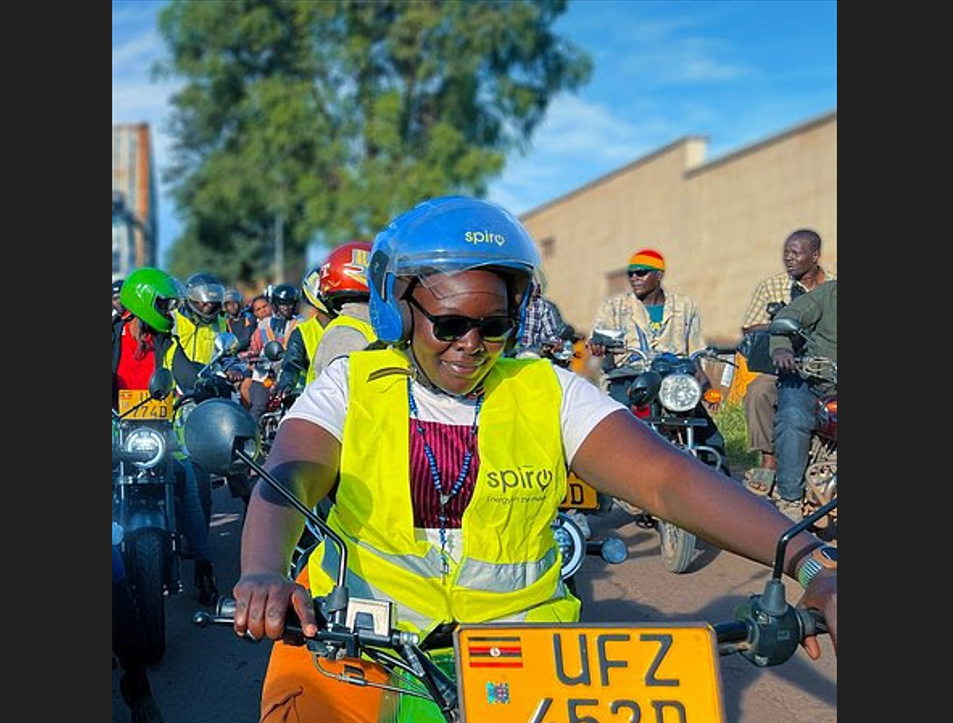In the bustling streets of Kampala, Uganda, amidst the cacophony of daily life, an evolution on wheels is taking place. Female motorbike taxi drivers, known as boda bodas, are steering towards a greener and more equitable future.
As well as navigating the urban maze, these pioneering women are also riding against the tide of traditional gender roles and environmental degradation. It’s not just about mobility – it’s a story of empowerment, sustainability, and challenging the status quo.
The Vanguard of Change and Tradition
Traditionally, African societies have designated roles for women, often limiting their participation in the workforce to sectors like agriculture, small-scale trade, and domestic care. These roles, while vital, are frequently undervalued and undercompensated, reflecting broader issues of gender inequality.
Facing these societal norms and logistical barriers, such as the lack of access to education and financial resources, Sub Saharan Africa’s women have historically been hindered from pursuing careers outside these traditional spheres.
In this landscape, the emergence of female boda boda drivers in Kampala represents a significant departure from the norm. The all-female Boda Boda stage (where riders assemble to attract fares) in the heart of Kampala, along Nkurumah Road next to Freedom Plaza is evidence of this change, providing safety and sorority for women in this challenging profession.
These women are redefining what is possible, challenging gender norms, and proving that women can excel in roles traditionally held by men. Their presence is a statement against stereotypes and beacon of empowerment for women across the continent.
An Environmental and Health Crisis
Amidst this backdrop of gender dynamics, a looming environmental and health crisis adds urgency to the narrative. Greenhouse gas emissions from transportation in Africa are soaring, with a growth rate of 7% annually, contributing significantly to global climate change. Compounding this issue is the severe air pollution, which has become the second biggest cause of death across the continent. In 2019, approximately 1.1 million people in Africa succumbed to air pollution-related diseases. These stark statistics underscore the dire need for sustainable transportation solutions.
Spiro: Pioneering a Sustainable Future
Enter Spiro, a visionary electric vehicle (EV) company, that is leading Africa’s post-COP28 charge towards sustainable transportation. With over 12,000 innovative electric bikes deployed across Africa so far, Spiro is at the vanguard of ecological revolution, offering a cleaner, more efficient alternative to traditional petrol-powered motorbikes. This shift is crucial for reducing carbon emissions and for addressing the health impacts of air pollution.
Spiro’s mission extends beyond environmental sustainability to encompass social empowerment, particularly for women. By embracing electric mobility, Spiro is dismantling traditional barriers that have kept women sidelined in the workforce. The reduced physical strain, lower operating costs, and environmental benefits of electric bikes make them an ideal tool for women seeking to enter or expand their presence in the boda boda industry. And the slick, clean design of electric bikes is moving the industry away from the traditionally masculine roar of the engine and waft of diesel and oil.
Celebrating Women’s Empowerment on Wheels
A shining example of Spiro’s commitment to female empowerment is its support for the all-female boda boda stage in the heart of Kampala, along Nkurumah Road next to Freedom Plaza. This stage, home to up to 85 women riders, is a symbol of resilience, independence, and the breaking of glass ceilings. It represents a safe space where women can thrive professionally, free from the constraints that traditionally bound them.
“I find it easy to navigate through Kampala’s busy streets because male riders and taxi drivers give way once they notice that it’s a lady riding a bike. I would argue that having more of my sisters in this business will make Uganda’s roads safer,” said Amina Nanteza, a Female boda boda rider.
The Ripple Effect Across the Continent
Spiro’s impact is resonating beyond Uganda. With operations in Benin, Togo, Kenya, Rwanda, and plans for expansion into Nigeria, Spiro is weaving a network of sustainable transportation that empowers women across Africa. This network is facilitating mobility and unlocking economic opportunities, fostering entrepreneurship, and contributing to the creation of sustainable urban ecosystems.
In Rwanda, six female riders recently joined Spiro’s proactive academy designed to bring more women into the Motorbike Taxi business. The company has assisted them with licensing, training, and financial support with the aim of fostering more opportunities for young women in Kigali.
The Road Ahead: A Greener, More Equitable Future
The journey of female motorbike taxi drivers in Uganda, powered by Spiro’s electric bikes, is a model for sustainable and equitable development. Their story is changing how people move while transforming lives and communities. As Spiro gains momentum, it serves as a powerful reminder of the potential for innovation, when aligned with social and environmental goals, to drive profound and lasting change. In this evolving story, the women boda boda drivers of Kampala, equipped with Spiro’s electric bikes, are leading the charge towards a brighter, greener, and more equitable future for Africa. Their journey can inspire change across the globe.









